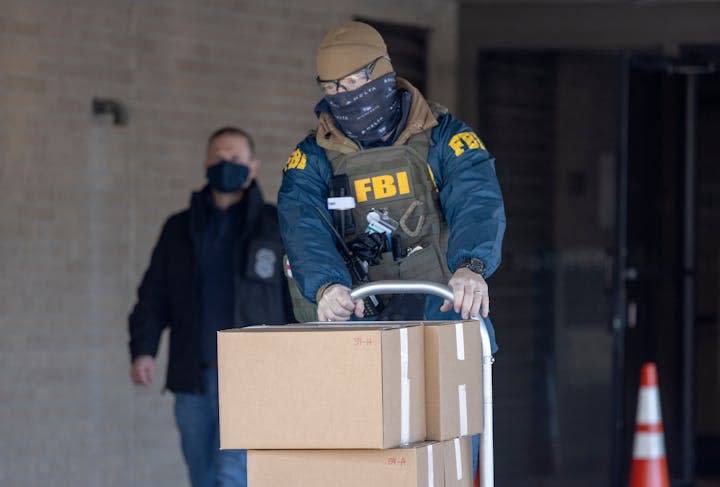FBI agent shows Feeding Our Future jury cash, gold jewelry, luxury cars seized

Wads of $64,000 in cash, gold jewelry from Dubai and a brand new Tesla and Porsche.
All were items FBI agents seized when they raided the home of a Shakopee businessman on trial in the Feeding Our Future case, an agent testified Friday — one of hundreds of law enforcement officers who searched more than two dozen locations in 2022 connected to the massive fraud scheme.
The unsealing of search warrants on that day, Jan. 20, 2022, publicly revealed the FBI's investigation, leading to charges and indictments of 70 people — seven of whom are on trial this month.
While many of the details about what FBI agents seized have been reported in court documents since then, Friday's testimony gave the jury their first look at the evidence as prosecutors seek to tie the defendants' lavish lifestyles during the COVID-19 pandemic to the millions of dollars they allegedly stole in federal reimbursements intended for feeding kids in need.
Assistant U.S. Attorney Daniel Bobier showed the jury photos of the inside of Abdiaziz Farah's two-story Savage home, and the piles of cash and paper trail of bank records and meal program forms that agents found. He asked FBI special agent Richard Frank about the evidence of "fruits of a crime" for which agents scoured the home, along with other businesses and homes in the case.
Prosecutors said more than $250 million was stolen from U.S. Department of Agriculture programs that reimburse day-care centers, nonprofits and schools for feeding low-income kids after school and during the summer — one of the largest pandemic-related fraud schemes in the country.
Farah, 35, who was charged in September 2022, owned Empire Cuisine and Market in Shakopee. The other defendants on trial include his brother, Said Shafii Farah, as well as Mohamed Jama Ismail, Abdimajid Mohamed Nur, Abdiwahab Maalim Aftin, Mukhtar Mohamed Shariff and Hayat Mohamed Nur.
The seven defendants collectively claimed to serve more than 18 million meals during the pandemic, receiving more than $40 million in federal reimbursements. They've been charged with wire fraud, money laundering and other crimes.
Defense attorneys have argued they served real food, giving out seven days' worth of meals at once and allowing their clients to rapidly escalate the numbers of meals doled out — and earning a fair profit, which they could spend as they like.
Prosecutors have alleged the defendants served little food at all, submitted fake invoices and grossly inflated meal count forms to claim millions of dollars in federal money.
The defendants' businesses were overseen by St. Anthony nonprofit Feeding Our Future and St. Paul nonprofit Partners in Nutrition, which administered paperwork for hundreds of meal distribution sites. Feeding Our Future's offices were also searched by FBI agents in January 2022, as was the Rosemount home of executive director Aimee Bock, who has pleaded not guilty to charges and denied any wrongdoing.
After two weeks of testimony from more than a dozen witnesses, including a Feeding Our Future employee who recalled a "booming" fraud scheme, prosecutors called FBI agent Frank to the stand Friday. He testified he was on a 14-member team that searched Abdiaziz Farah's home for seven hours on a chilly January day, seizing two iPhones, a laptop, purses and passports, among other items.
Bobier showed photos of more than $64,000 in cash that agents found inside the home and cars. He displayed photos of other luxury purchases including plane tickets to Turkey, gold jewelry Abdiaziz Farah's wife bought, and four cars — including a brand new Tesla and Porsche — all of which agents took as evidence.
Bobier also showed financial documents for the $1.1 million Prior Lake property Abdiaziz Farah bought to build a custom 8,000-square-foot house on the lake. Bobier asked Frank about the meal forms that agents found in the house and the bank records that showed large wire transfers from Empire's business accounts in 2020 and 2021 to banks in China and Kenya.
On cross-examination, defense attorneys questioned Frank about his limited knowledge of the case, which was confined to the search of Abdiaziz Farah's home and not their clients' homes, in an effort to distance their clients from his testimony. Andrew Mohring, who represents Shariff, asked if Frank knew that entities in the case bought $5 million worth of food. He said he didn't.
Mohring asked if he was aware the execution of search warrants generated significant publicity. Frank answered he was aware that a $250 million fraud scheme generated a lot of publicity.
The case has drawn hundreds of news articles in the last two years, which made it difficult to find impartial jurors in the case.
Ian Birrell, who represents Said Farah, asked Frank if any of the evidence they found was hidden, perhaps in secret compartments. Frank said it was just left out in the open.
The cars, cash and bank accounts FBI agents got in 2022 are part of more than $66 million the federal government has seized in the case so far. Of the 70 people who have been charged or indicted, 18 have pleaded guilty. Prosecutors have said they expect to file additional charges.
The trial, which started April 22, continues next week, Other FBI agents and forensic accountants are expected to testify.
